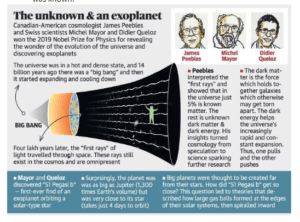The Big Picture- RSTV
Nobel 2019 Winners for Chemistry, Physics & Physiology or Medicine
Archives
TOPIC: General Studies 3
- New development in Science & Technology
The 2019 Nobel Prize
In Chemistry has been awarded to John B. Goodenough, M. Stanley Whittingham and Akira Yoshino for the development of lithium-ion batteries
- Lithium-ion batteries have revolutionised the world of technology. The batteries power everyday products such as smartphones, laptops and even electric vehicles.
- Through their work, this year’s Chemistry Laureates have laid the foundation of a wireless, fossil fuel-free society
- The work of this year’s Chemistry Nobel laureates led to the development of “a lightweight, hardwearing battery that could be charged hundreds of times before its performance deteriorated.”
- The advantage of lithium-ion batteries is that they are not based upon chemical reactions that break down the electrodes, but upon lithium ions flowing back and forth between the anode and cathode
In Physiology or Medicine has been awarded to William G. Kaelin Jr, Sir Peter J. Ratcliffe and Gregg L. Semenza “for their discoveries of how cells sense and adapt to oxygen availability”
- The discoveries made by the three men “have fundamental importance for physiology and have paved the way for promising new strategies to fight anemia, cancer and many other diseases.”
- Their research established the basis for the understanding of how oxygen levels affect cellular metabolism and physiological functions
- Oxygen sensing is central to a large number of diseases, it said. Intense ongoing efforts in academic laboratories and pharmaceutical companies are now focused on developing drugs that can interfere with different disease states by either activating, or blocking, the oxygen-sensing machinery.
In Physics has been awarded to Canadian-American cosmologist James Peebles and Swiss scientists Michel Mayor and Didier Queloz for revealing the wonder of the evolution of the universe and discovering planets orbiting distant suns.
- Using theoretical tools and calculations, Peebles was able to interpret trace radiation from the infancy of the universe and so discover new physical processes
- Mayor and Queloz announced the first discovery of a planet outside our own solar system, a so-called “exoplanet”, starting a revolution in astronomy. Over 4,000 exoplanets have since been found in the Milky Way.
- With numerous projects planned to start searching for exoplanets, we may eventually find an answer to the eternal question of whether other life is out there

RSTV IAS UPSC – Nobel 2019 Winners for Chemistry, Physics & Physiology or Medicine
For Peace has been awarded to Ethiopian Prime Minister Abiy Ahmed Ali for his efforts to achieve peace and international cooperation, and in particular for his decisive initiative to resolve the border conflict with neighbouring Eritrea.
- The prize is also meant to recognise all the stakeholders working for peace and reconciliation in Ethiopia and in the East and Northeast African regions. Ethiopia is Africa’s second most populous country and has East Africa’s largest economy. A peaceful, stable and successful Ethiopia will have many positive side-effects, and will help to strengthen fraternity among nations and peoples in the region.
- In Ethiopia, even if much work remains, Abiy Ahmed has initiated important reforms that give many citizens hope for a better life and a brighter future. He spent his first 100 days as Prime Minister lifting the country’s state of emergency, granting amnesty to thousands of political prisoners, discontinuing media censorship, legalising outlawed opposition groups, dismissing military and civilian leaders who were suspected of corruption, and significantly increasing the influence of women in Ethiopian political and community life. He has also pledged to strengthen democracy by holding free and fair elections.
In Literature, has been awarded to Peter Handke “for an influential work that with linguistic ingenuity has explored the periphery and the specificity of human experience.”
NOBEL PRIZE
The Nobel Prize in Chemistry is awarded by the Royal Swedish Academy of Sciences and is one of the five Nobel Prizes that were established by the will of Alfred Nobel, a businessman, chemist, engineer, inventor, and philanthropist.











